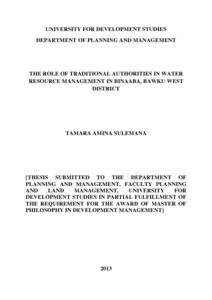Resource information
Current water reforms in most African countries focus on decentralizing water management to the water users, as a way of improving water governance. The target of these reforms is equity, efficiency and sustainability. Unfortunately the reforms tend to concentrate on the use of statutory laws, and give little consideration to the already existing traditional practices. This report presents the findings of a case that examined traditional water management practices in Binaaba located in the Bawku West District of the Upper East Region of Ghana. The study examined water-related management activities around the Binaaba Dam, which is a small multipurpose dam. Binaaba dam is unique one in that it is fed by both base flow and rainfall. It has survived major droughts in the area and significantly, has not silted up in its more than 40 years of existence. Key informant interviews and structured questionnaires administered at the household level were used to assess traditional water management practices in terms of their existence and their effectiveness for sustaining water supply and rural livelihoods. Their implications for IWRM, and therefore improved water governance, were also assessed. The study revealed that customary laws govern water resources management. Traditional leaders preside over all water-related issues. They were responsible for setting up the rules governing the water resources, demarcating specific areas around the water sources, handling of offenders and management of conflicts. Sometimes they carry out these roles together with the entire community. The traditional water management practices were also found to be quite effective for sustaining food production, because everyone is allowed to have access to the water. Moreover, water resources are managed as a whole system; during the rainy season people use water from other sources, while preserving the dam water for the dry season. The majority of the people are not aware of the IWRM, indicating that the attempts to introduce IWRM in this area have not been effective. The study concludes that it is important to seriously take into consideration traditional water resources management practices, as these are vital for improved water governance. However, it is essential to first assess the sustainability of the traditional water management practices for effective IWRM implementation and therefore improved water governance.


